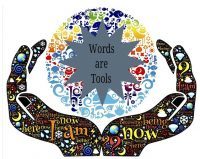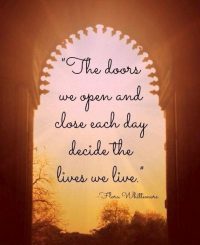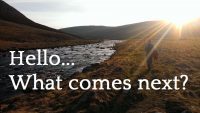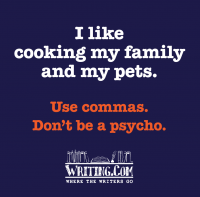Vivian Probst's Blog
February 4, 2019
Birth of WEnglish
 Over the last few months, I reopened a writing project I started over ten years ago. It’s a five-volume series called “The Womun Who Forgot Who She Was”. With new fresh eyes on the project, I knew what I had to do with it…write it in WEnglish! WEnglish is writing in a more gender-balanced English language. My full explanation of WEnglish can be found here, however, I wanted to explain where it all started. I looked back in my journals, and found these entries:
Over the last few months, I reopened a writing project I started over ten years ago. It’s a five-volume series called “The Womun Who Forgot Who She Was”. With new fresh eyes on the project, I knew what I had to do with it…write it in WEnglish! WEnglish is writing in a more gender-balanced English language. My full explanation of WEnglish can be found here, however, I wanted to explain where it all started. I looked back in my journals, and found these entries:
March 16, 2008 My work with English began with one word: Helium. A character in one of my (yet unpublished) novels was rewriting our Periodic Table and I was trying to understand why. As I reviewed a standard periodic table, ‘He’, our symbol for Helium, jumped out at me. My mind immediately went to work on ‘he’ words. “Helium, Heat, Health, Heathen, Hymn, A-men, I wrote in my journal that day–English words that emphasize masculine qualities. I didn’t know it, but I was on my way to creating “WEnglish” because I needed a way to make English work for ‘that which is not male’ as well for men. I wanted to see if I could write well, even better with non-gender words (except as I was writing about a specific gender).
March 22, 2008 I discovered what I now call ‘word twists’ by twisting our word, ‘A-men’ into other words. NEMA, ENAM, NAME, MEAN, NEAM, EMAN, and MAEN. Holy crap, I thought. Look at these words we use that spell ‘man’ words*.
March 26, 2008 My older sister, Cheryl, died after a two-year battle with ALS.
April 7, 2008 I had a dream that Cheryl and I were in a library, looking at an ancient book written in invisible ink. I asked tha* (not a typo) librarian for whatever liquid would reveal its mysterious words. Her facial expression and secretive, reluctant way of giving it to me, told me that something BIG was occurring. I received a small brown glass bottle, sealed with an eyedropper lid and filled with a black substance that I took back to where Cheryl was waiting by tha strange book. My journal tells me that “We were suddenly surrounded as if others were intent on taking tha paper from us.” Ever since that day I felt like my stories were being hounded-or perhaps protected-to prevent their being published. Now I think I know why and it has everything to do with ‘WEnglish’.
April 14, 2008 I was still doing book research and went to tha University of Chicago Library, their ‘Special Collections’ room to read from an old 16th century book by John Napier, titled “A Plaine Discovery of St. John” published in 1593. Napier had come up in my research for that same (yet unpublished) story.
How had all these events synchronized so incredibly together? Was there a purpose? Was my deceased sister orchestrating events from higher realms?
Over 11 years later I realize that ‘WEnglish’ had come to life back then. It has become a perfect way for me to allow dignity and honor to come to ‘wimin**’, as well as to respect men through my speaking and writing. I hope you will join me on this journey with WEnglish as well as with my new book. More to come!
The greatest tragedy is to lose what you never knew you had until you lost it.
Vivian!
*THE is our most common English word. WEnglish acknowledges that we most often pronounce it ‘Tha’ and therefore uses both spellings based on pronunciation, just like we do with ‘a’ and ‘an’.
**A WEnglish spelling based on how we pronounce ‘women’
The post Birth of WEnglish appeared first on Vivian Probst.
December 13, 2018
How to Change a Man…Is It Necessary?
 In a Glamour magazine that was honoring women, I recently read a quote that stopped me cold. It said, “I believe the lives of women cannot improve, that women cannot thrive, until men free themselves from the constraints of the male code.” (1)
In a Glamour magazine that was honoring women, I recently read a quote that stopped me cold. It said, “I believe the lives of women cannot improve, that women cannot thrive, until men free themselves from the constraints of the male code.” (1)
Truth or fiction? Agree or disagree? Is our freedom truly chained to what men decide to do or not do? God, I hope not.
Yes, I believe men are in part responsible for our imbalance. Patriarchy hasn’t done much to endear itself to those of us who are not male. But I don’t agree that ‘they’ need to change before we can have an impact on our own lives. In fact, I believe everything will change based on what we as ‘that which is not male’ decide to do next. Are we going to lean into our power or stay attached to an idea that says we cannot become free until men act?
I’d like to suggest a different, and perhaps unique approach. Let’s change our words and see what happens to our world. Perhaps it’s because I’m a linguist but I’ve studied our masculine use of words for over a decade and I believe there’s room for change—big change—that could change everything. In fact, it’s altered my writing and my speaking—in order to bring more respect to us.
Are we conscious enough to realize that in English there is no way to refer to ourselves without using male words? Do we realize that English is one of only a couple of known languages that do that? How does it feel, as a woman, to be forced to attach what describes you to a masculine word? WoMAN, WoMEN, LADy, FeMALE. Is it truly acceptable to us to be so chained that even our language does not respect us as free and independent people (huMANS as it were)?
As English continues to prevail as our world’s most commonly used language, I believe it’s important to pay attention to what our words suggest in literal and subliminal ways. As a linguist I’m concerned that we use ‘man’ words so liberally in English (ISH also spells ‘HIS’ and ISH is ‘man’ in Hebrew in case you’re interested) with almost complete disregard and disrespect for anything that is not male.
It’s not a shock to most of us that English is not in favor of our ‘fairer (i.e. purportedly weaker but fairer) sex’, in fact we joke frequently about how many man words are used, even to describe our own bodies and sacred processes. For over a decade I studied how English words are coded toward men and against us. I undertook to remove unnecessary ‘man’ words to see if it could possibly make a difference. I stopped using words that refer to ‘men’ without an equal reference to ‘that which is not male’, except in gender-related context. I call it ‘WEnglish’.
I believe that it is imperative that we, as ‘fifty percent of the sky’, create our own new words to describe ourselves. Most other languages already do that; why not English?
I believe there is as much power in our tongues as there is in our swords (notice that ‘words’ also spells ‘swords’ and I don’t think that’s a MIStake).
I believe it is right and good that those who are not male be equally represented by English and I can suggest three or four simple ways to do that. Number One? Learn to refer to ourselves without using ‘man’ words.
How to change a man? Let’s take our equal place in life, assume our power, and allow our world to rebalance itself.
Vivian!
The post How to Change a Man…Is It Necessary? appeared first on Vivian Probst.
November 14, 2018
Love Your Friends…Especially The One Inside
 I met a woman recently who I sensed was very lonely. She said to me, “I hope I make a difference to others. I can’t tell–no one wants to be my friend.”
I met a woman recently who I sensed was very lonely. She said to me, “I hope I make a difference to others. I can’t tell–no one wants to be my friend.”
OK. It’s a SAD time of year, isn’t it? Let’s dive in…
We were in a group and I couldn’t talk to her further, but here’s what I’d say if I could (and who knows—maybe she’ll read my blog or Life will give us a chance to meet up again under different circumstances. Anyway, here’s what I’d say:
“Honey, stop right there, sweetheart. You don’t need to spend any time wondering if you make a difference, you DO! Every day, in ways you might not even be able to imagine. You make a difference!”
I’ve heard people say that before, “I hope I make a difference.” And every time I want to grab a microphone and say, “Hey everyone, YOU, and YOU, and Y-O-U, and YOU over there–YOU make a difference, every day, in every way.”
It’s fun to look at a situation I’m in and find opportunities to make a positive difference. It has to be honest and genuine because people can tell if it’s not.
Now, about having friends:
Some of us are introverts. We don’t thrive on having a lot of friends—just a few close ones work just fine.
More of us are extroverts and we feel best if we’re interacting with others. It’s important to know which group you naturally prefer.
There are those who don’t have a sense that anyone is a friend. Trying to reach out to someone else to develop a friendship can be tough and full of a sense of rejection.
And we’re all busy—busier than ever, I think, so we don’t invest must time in getting out of our comfort zone to meet new people. My husband and I have five children and twelve grandchildren. Most of these wonderful people we call family, live within fifteen minutes of our house. Even so, we don’t get together regularly and it’s sad if I stop to think about it. But life is like that and it’s good to be OK. Plus, be very clear that blood relatives are not obligated to be connected to us.
As I look back on my friendships over my six plus decades of life, I reach a conclusion that friendships happen. Sort of like falling in love—friendships are born in our hearts.
My best friend in my entire life I met on a snowy winter night about forty years ago as she was trimming extra limbs off of her freshly-cut Christmas tree. It was WHAMO—best friends.
It’s important to be a bit sociable and to put ourselves out there from time to time, but the best place I’ve found to go to find a friend is inside. If I’m lonely and feel like I need a friend, it’s a good idea if I’m friends with myself first. Other people can’t be available to us as much as we might like, much less behave like we want, but there’s a big difference between being alone and being lonely. Those terms are not synonymous.
In my book, ‘I Was a Yo-Yo Wife…Until I Learned THIS’ I share how I found a simple way to fix my marriage and to make my husband my best friend: I started to treat myself with love and respect, instead of wanting it from him. It was (and still is) magical! We are more in love than ever. How can it be that me taking care of me makes such a difference in love and friendship?
Be very good to yourself first and watch who crosses your path. If people don’t come banging on your door or text you to invite you out, let that be OK. It could be there’s a friend inside who’d like some of your time right now. Oh, and if at first you don’t succeed…keep making a difference anyway.
Vivian!
The post Love Your Friends…Especially The One Inside appeared first on Vivian Probst.
October 19, 2018
Behind Door #1
 A few days ago I turned 66 which for me opens a gift I’ve been paying for during my working life—social security. People look at me funny because I’m so excited to finally be able to draw on those funds, but really, even though it’s my own money that I’m getting access to, it’s still a thrill. Call me crazy, but I’m really pumped!
A few days ago I turned 66 which for me opens a gift I’ve been paying for during my working life—social security. People look at me funny because I’m so excited to finally be able to draw on those funds, but really, even though it’s my own money that I’m getting access to, it’s still a thrill. Call me crazy, but I’m really pumped!
Just a couple of weeks ago I was watching ‘The Price Is Right’; it was a rare opportunity because I never watch daytime TV. I think I was getting some work done on my car. Anyway, I recall seeing a woman on stage and she was winning really insignificant things, like some new kitchen knives, some appliances, and I think some tools. I’m thinking, “WOW. This is really depressing…has even ‘The Price Is Right’ gotten so low as to give away cheap gifts?” Just as I’m thinking that, Door #1 opens to an announcer saying, “And a new car!” Much better!
What if Life has doors behind which different choices lead to different results? We won’t know what’s behind other doors once we choose one, which makes each one important. However, what if there’s one door that if we open in first, will make everything work out best for us? No, not perfectly, not without lessons, but one that gets us going on our best path?
I believe that door exists, and I call it my ‘Adore’ door.
Here’s what I’ve learned in 65 years…nothing works very well until you learn to adore yourself. Some people still believe that it’s selfish and wrong even though taken in context it’s incredibly important. If we don’t honor who we are and follow our true passion, we get off track and life is just hard.
I learned that only after spending years trying to follow a path that wasn’t mine. It worked for others and I truly believed that it should work for me as well. That made me a follower, which is a clue to being on a path that might not actually be yours…especially if you aren’t having fun; especially if you feel like you ‘have to’; especially if you keep thinking about other things you’d rather be doing.
To adore oneself is really about self-respect; about putting what I believe and what I want to do with my life in first place. I call it Me First. If you believe, like I do, that Life has a purpose for us being where we are, it’s not only important to follow that sense of what your life is about, but it’s downright, bottom line, essential to a wonderful life.
Every so often during a day, I like to stop and ask myself, Right now, am I doing exactly what I believe is best for me and my life? Am I adoring who I am–who I was created to be? Does my life feel right to me? I can usually tell if I’m ‘on purpose’ because I get a sense that I am truly doing what I’m doing to honor myself and my life. Somehow, everything else simply opens up in incredible ways and everyone gets my best.
More about how to love and adore yourself in my memoir, “I Was a Yo-Yo Wife…Until I Learned THIS!”.
Vivian!
Stay tuned as I put finishing touches on a six-volume series titled “The Woman Who Forgot Who She Was”. Coming 2019 (I hope).
The post Behind Door #1 appeared first on Vivian Probst.
August 1, 2018
Setting Sail
 Dear Friends of Author Vivian Probst,
Dear Friends of Author Vivian Probst,
As my husband and I prepare to set sail on a cruise of the Scottish Isles on the North Sea, I am keenly aware of how long it has been since I’ve written to you. The good news is that I’m still writing and a two-week cruise should give me time for more of that. Here’s what’s up…
The Woman Who Forgot Who She Was (novel series I started some years ago) sits in 4 volumes with a 5th being written as I have time. My specific project right now is to bring these 4 volumes into present tense and then to drop them into a specific location. I have never had an opportunity to pick a particular (real) location for a plot to take place. Now, however, I get to use my home town of Waukesha, WI and then pieces of London, England and around Edinburgh, Scotland. Interesting that our ship will land in Edinburgh, and we will have three days there, isn’t it?
These books are being written in a type of English that I am calling ‘Shenglish’ because I am learning how to write without using words that give male gender dominance to English while not demeaning our own gender with negative words. For instance, think how often we apply the prefix ‘mis-‘ in our language to speak of something that’s wrong: mistake; misbehave; misappropriate…
‘Miss’ is also how we address young women, so I’ve decided to avoid using negative ‘mis-‘words in my stories. There’s much more than that to shift our language into more gender balance. In these days of ‘Me, Too’ I think it’s time that our language support all of us more equally. Quite an adventure! More to come…
With affection,
Vivian!
The post Setting Sail appeared first on Vivian Probst.
April 12, 2018
What’s Next?
 Recently I stepped away from a project that was right up my alley: challenging, time-consuming, and interesting—plus it paid me. You might wonder why I did that and I’m inclined to tell you because I could use some support (and maybe some advice).
Recently I stepped away from a project that was right up my alley: challenging, time-consuming, and interesting—plus it paid me. You might wonder why I did that and I’m inclined to tell you because I could use some support (and maybe some advice).
As most of you know, I have run my own business for over thirty years, traveled the country and I’ve written and published a couple of books in my ‘spare’ time. (My children left home long ago so if you’re thinking you should be able to do all that and raise children, you’ll have to get your advice on how to do that from someone else.)
Anyway, when I took on this project, I was awe-struck by how difficult it was for me to let someone else give me instructions on how to do things, which is what it required. I thought I could easily slip back into being an employee but I couldn’t bear it. I lost sleep because I so wanted to continue to do things with the freedom I was used to that I couldn’t stand it. It got really bad, so I resigned.
Leaving that project has left me with something I’m not sure what to do with–free time. Now I’m doubly awe-struck by the shock of having time on my hands. It’s the biggest challenge I’ve faced—ever.
I’m always busy. My parents raised me to have a mission and a purpose which I embraced. Almost nothing is more fun for me than having too much to do (unless someone else wants to control it as in the case referenced above). Has anyone felt this way or is it just me? Am I crazy?
Thankfully, I still have my consulting business that I love and it keeps me somewhat occupied; I still have books to write, and that keeps my somewhat occupied—but I’ve never really felt like I had much of a choice about what I’m going to do with my time and that’s darned uncomfortable.
I know people who can’t wait for retirement; I’m dreading it. I know retirees who are loving their freedom; I’m having panic attacks. What do people do when they have options? I’m practicing mindfulness, reading about living in the present moment, and taking supplements to calm me down. (Magnesium has been recommended and seems to help.) I’m watching what I eat, exercising, and trying to comprehend a dilemma I never thought I would have to face. I haven’t reached the point where getting the mail is the highlight of my day but..when my books get finished I might take up screen play writing or acting. Or see a therapist. Maybe all of the above?
Vivian!
The post What’s Next? appeared first on Vivian Probst.
March 20, 2018
The Truth About Detox
 Thinking about doing a detox of the first time? Read this before you decide detox is a good idea.
Thinking about doing a detox of the first time? Read this before you decide detox is a good idea.
When a friend suggested I join her on a 10-day detox, it sounded so simple and good for me. Drink two shakes each day and eat one meal. Avoid sugar (which included my beloved dark chocolate), cheese and dairy, and alcohol. My husband is importing wines from small boutique vineyards in other countries. You can imagine that wine is a staple in our diet. It was only ten days and it would be good for me.
It’s true. A detox is generally considered good for your body. It’s what I didn’t know about the experience of detox that made my husband insist that I never do it again. And it wasn’t until during my detox that I finally studied the pros and cons. Here’s what I now know is important to consider before: Could NO or NOT RIGHT NOW be the right answer?
1)First of all, check with your doctor. A dietary detox has side effects. Make sure you and your body are ready for this. In my case, my doctor had been recommending a detox for me so I knew it was a good thing to do.
2) If this your first experience with a detox? If so, make sure you ‘know before you go’. Now Google and the internet can scare you about just about anything. However, reading a few articles about symptoms associated with a dietary detox before you begin is beneficial. If you’re like me I did not; I simply wasn’t prepared for the shock, the almost devastating impact. It’s not that we shouldn’t detox; it’s that it’s good to be prepared.And I didn’t because I consider myself a pretty healthy 65-year-old. I’ve been drinking green juice for years. I start each day with hot lemon water. I do yoga, have acupuncture treatments, get massages; I work out. My husband says I could retire on what I’ve spent on supplements and he’s probably right. I don’t drink soda. My husband and I normally eat a Paleo-oriented diet. I thought I was doing so many right things that this 10-day period would not be much of a challenge
Admittedly, I have some food challenges. Red wine (which is sort of good for you) and dark chocolate to which I have had an addiction for years. I eat it if something bad is happening; I use it to celebrate when good things are going on. There’s no time when chocolate is not called for. I wonder if the inordinate amounts I can eat have any historical components. My mother would take the four of us children (all of whom she had born in less than six years) in a shopping cart to the grocery store and head straight to the candy aisle which she would pick up a box of chocolate-covered peanuts and chocolate stars and consume them during the shopping excursion. I don’t blame her; but I do think my relationship with chocolate as a soothing food is very old.
In summary if you’ve never gone through a detox before, I’d say study before you begin. Know what happens during a detox. (Of course, be sure to consult with your doctor—mine had recommended it)
3) Clear your calendar as much as possible for about double the time of the detox. In my case that would have been twenty days because after the ten-day detox, I needed time to recover. Make sure these are not going to be busy, hectic days because you might not feel up to much. If you have a job and must be working, fine. Just know what you are about to experience. If you can take a few days off, even better.
About four days into the detox which until then had felt so easy and good for me, I suddenly felt like I had the flu—and I never get the flu. Everyone around me can drop like flies in flu season—I don’t—or didn’t. I give my ‘healthy’ diet the credit. So, I, who didn’t get sick; who never ran a fever or suffered through the flu was devastated. I started running a fever, I had chills and I hurt all over. I also developed a cold! Why was this happening to me? OK GOOGLE. That’s when I decided to study detox.
It was actually reassuring to learn that these were normal detox effects. It’s just that if I’d studied before starting the detox I would have been better prepared. And I might have considered my schedule more carefully. I’m a busy career woman and it was brutal trying to keep up with my work load. I’d suggest you cut yourself some slack because you might need it. If I ever do this again, I’m going to a detox facility where they pamper you while your body is releasing years of toxins.
Remember my detox was to release old and perhaps bad junk out of my diet. It had nothing to do with drugs or alcohol rehab, although giving up red wine for ten days surely contributed to my symptoms. As the book ‘Food As Medicine’ suggest, food influences the chemistry of your body so if you suddenly stop something, your body might get more than a little upset until it adjusts. And as one article I read explained, it’s not you that is detoxing—it’s your body doing what a body does when it’s deprived of something suddenly and gets marching orders for new eating habits.
In summary, if you’re like me and you think this is no big deal so you’re detoxing at home, think again. At least reassure those close to you that when you collapse into bed with body aches, chills, and fever or other issues that these are signs that your body is relieving itself of toxins or you’re extremely crabby, that it’s a good thing. They might not believe you so be sure you have a good support team as back-up. You might want lots of sympathy and sometime immediate family is not your go to.
4) We are body, mind and spirit so if we think we are only going to detox our physical selves, we might be surprised when emotional issues show up. That’s what happened to me. WHAMO. For instance, if you have tendencies toward low self-worth, anxiety, the need to control everything, unresolved anger, and so on during your normal life—if you are prone to this or that, it could flare up during detox. (If you’re on medication, follow doctor’s orders. This is not drug rehab). Irritability is a common symptom and other issues might show up. If you don’t think food affects your emotions, do a detox and see what happens. (Actually, don’t do that but I rest my case for myself.) Of course, you’re irritable and cranky.
But we can’t separate ourselves into neat little compartments. Here’s the most shocking thing I learned. Emotional issues are likely to take advantage of your weakened condition and break through otherwise strong defenses. Imagine my surprised when a long past issue came back to me with such force that I knew I had to deal with it and that’s no fun if your brain is foggy; you won’t be a sharp as you normally are and suddenly something becomes an issue that really isn’t normally an issue except that now that you’re feeling so poorly, there it is.
In my case, I was hit broadside by something that normally I could have ignored. Maybe it was actually a head-on collision. But oh, I so needed to see it and resolve it; sort of like a gift wrapped in razor blades. I could go into details here but suffice it to say that I had to work it on a much deeper level than I ever had in the past and now I believe it’s finally released.
I could have said, “Oh, I’m not really sensitive about that—it’s just this detox.” I choose not to take that approach. If it shows up, it wants my attention.
Allow whatever emotional issue you experience to be there and be very loving toward yourself because along with getting rid of body toxins, your inner being is dumping these types of feelings because it can. I believe that’s why so many of us feel like a million bucks after the detox—because we’ve gotten rid of the nasty stuff we’ve been carrying around, physical and emotional. (I’m not at the million bucks stage yet).
5) Have a good support system. During detox I saw a psychologist for the mental/emotional stuff. I had cranial sacral work. I visited my chiropractor and had a massage. All of this is helpful. Take care of yourself! I am not suggesting any of these practices for others. However, these have been helpful to me
6) Drink lots of water. Some resources suggest you drink half of your body weight in ounces of water daily. If you weigh 140 pounds, that’s 70 ounces of water each day. Water moves the toxins out of your system more quickly so that theoretically you won’t feel quite so bad for quite so long. Aren’t we advised to do that anyway? I am being much more conscientious about that now.
7) Once the detox period ended, it’s wasn’t like I could go right back to eating as I had in the past. I’m still drinking lots of water, using the same greens and smoothie recipes, sipping bone broth, and taking my whole food supplements. I’m not exactly sure how my diet will be affected in the long term. I’d love to celebrate with a glass of wine and a couple of pieces of chocolate but right now my body isn’t interested so apple cider vinegar tea with honey will have to do.
And at the end of this experience I care even more now about what I put into my body and I know what to expect if I choose to detox again. Will I go ever do that? Not if my husband has anything to say about it. Maybe an occasional fasting day will suffice but here’s what I’m sure of: if I do, I’m going to a spa and leaving my husband at home.
Vivian!
Vivian Probst is a national business consultant to the affordable housing industry, author of two books, and definitely not an expert in health care. She writes to share her experience in case it helps anyone else. Visit her at vivianprobst.com. And if you’re thinking of detoxing, talk to your doctor first.
The post The Truth About Detox appeared first on Vivian Probst.
February 20, 2018
So, THIS is Writer’s Block!
 March 10th will be the 18th anniversary of my writing life and here I sit–not writing–for the first time in almost two decades. It’s not that there’s nothing to write about—far from it! But I am restrained, as if someone has hit the ‘pause’ button or put my creative juices in the freezer. Is this that ‘writer’s block’ idea I’ve heard people talk about? Before this, the only Writer’s Block I had ever experienced was a bottle of wine by that name. (And it’s yummy!)
March 10th will be the 18th anniversary of my writing life and here I sit–not writing–for the first time in almost two decades. It’s not that there’s nothing to write about—far from it! But I am restrained, as if someone has hit the ‘pause’ button or put my creative juices in the freezer. Is this that ‘writer’s block’ idea I’ve heard people talk about? Before this, the only Writer’s Block I had ever experienced was a bottle of wine by that name. (And it’s yummy!)
I’d like to process this concept with you because when I feel blocked, I feel very alone; cut off and isolated. I could use some support. Here’s what I think I’m learning just in case it helps anyone else who’s feeling a dead spot in life that used to be teaming with activity.
First of all, whatever blocks us, teaches us. Get ready to learn—that’s what I’ve learned.
Secondly, we all need to pause now and again even if we feel like the timing’s wrong. Our productivity and creativity must be nurtured. If it’s feeling abused, it has a propensity to quit on the job and it doesn’t care what the impact is.
Thirdly, ever notice how (for most of us), it’s our natural propensity to sleep every sixteen hours or so? Sure, we can stay awake longer and use artificial stimulants to stay conscious, but that can lead to disaster. Same for creativity. It has to be fun and captivating and we must be awake enough to recognize when it arrives.
We need rest and so does our creativity. Why do we beat ourselves up instead? Because we have a deadline? Because if we don’t meet it, we think our lives are over? I’ll be honest, it is scary. Once I hit this period of time, I squealed like to stuck pig and went into counseling because I have such deep grief about not being able to write.
My nudge to take a break came to me a few months ago after I completed my memoir, ‘I Was a Yo-Yo Wife’. I had to stop, even though I already knew what I’d work on next. Thank goodness for my assistant, Beth, who advised me to stop for a while even though I must have looked at her as if she had suggested I stop breathing. I also checked in with my astrology chart and an IFS therapist to understand if it was the right time. Not writing felt like I needed a permission slip from an authority I respected; it wasn’t the kind of thing I could do without a support group.
Thirdly, let’s not call them blocks; let’s call them bridges. A block can scare us; a bridge feels more like a transition point over an otherwise impassable area. It’s simply a vitally important pause so that we can rejuvenate. And if there were no more stories for me to come back to—in a worst-case scenario—that could still be a blessing.
It’s important to remember, that who we are is not about what we do. A pause in creative activity reminds us that we are more than a label—a talent factory making only a certain product. We are more than the process of meeting our own or someone else’s expectations. In other words, as long as I am being directed from within, I can roll with the punches. It’s when I’m looking
Here’s what made it easier for me.
Our creative purpose does not stop just because we do. I believe that the energy that creates does not stop while we are resting and restoring ourselves. Behind the scenes there is plenty of activity going on—we just can’t see it. Everything is still on target and on schedule for its purpose. While external activity appears to cease, it doesn’t really. What needs to be done is getting done even if we think we’re not ‘doing’ anything. In fact, our most creative work probably happens when we’re not paying attention. Imagine the fairy tale about The Shoemaker and the Elves? While I’m busy with other things, I imagine that my stories are getting the additional content they need. That makes me excited about getting back to work.
You’ll know when it’s time to get back to work.
So, rather than a ‘block’, a time of not writing is really an important break in the action so that we can renew and revitalize. It’s a good thing.
It might help to actually plan some time away from writing before the blocks show up. Look at your calendar and put social time in as if it were an important appointment. Let friends and family gather around and connect with you. Think of what they sacrifice every day so that you can devote yourself to your calling. It’s also good if you do something different with your time off. Take a trip; take a class; try a different creative activity; do some research, join a health club.
Much of a writer’s life is spent on their asses so that a day, week, month—whatever—to stand up, stretch, and step out into the real world again can only be a good thing!
Vivian Probst
The post So, THIS is Writer’s Block! appeared first on Vivian Probst.
September 18, 2017
Coming Out From Under the Covers
 Is it safe to come out now? Am I the only one who has been emotionally whipped by long weeks of astrological, solar, moon and weather-related terrors that I have felt all the way to my bones? If so, that’s OK. Somehow, I think other people have similar feelings at times like these.
Is it safe to come out now? Am I the only one who has been emotionally whipped by long weeks of astrological, solar, moon and weather-related terrors that I have felt all the way to my bones? If so, that’s OK. Somehow, I think other people have similar feelings at times like these.
I was always the family scare-dy cat. My earliest memories are of things that scared me. It’s over sixty years later. Have I learned anything?
You bet I have.
I’m a writer with an over-the-top imagination that lets me play the ‘what’s the worst thing that could possibly happen?’ game. I have dreams that I think would make Alfred Hitchcock roll over in his grave.
For a fiction writer, an active imagination is an essential tool. But, if it turns on you and begins to affect your real life, you need some tools to deal with it–in case it thinks it has an upper hand. In case it thinks it’s stronger than you are. We should talk with Stephen King.
I have learned that it’s OK to be afraid. I don’t like how it feels, but it keeps me humble and compassionate, even if I’m the only one who can’t finish watching ‘Downton Abbey’ because I just know creepy things are going to happen now that Matthew and Mary are married.
Fear often reflects a deep-seated desire. The more afraid I am of something that I truly want to achieve, the more I recognize it as important to my soul. Therefore, I lean toward my dreams even though I know how prone I am to shut my fingers in the door if something looks like it’s going to fail.
I also know for sure that sometimes my fear is a leading indicator that something is too big for where I am right now or the timing is off; or no one is showing up to support or assist. Activities that sound marvelous in my dream world but don’t make sense when I ask the serious questions such as, ‘Is this MY work’? ‘Does this fulfill my soul purpose?’
When your mind is full of ideas it’s easy to think that you’re supposed to fulfill all of them. I’ve learned that’s a merry-go-round that will wear you down if you don’t get off.
Life supports our true purpose (which often doesn’t look like a purpose at all because it’s so comfortable, so we get can get disappointed). One thing I’ve learned to do is to ask myself: “If I don’t realize this dream in my lifetime, who will it impact?” Most of the time, it’s just me thinking that if I don’t leap a tall building in a single bound and save the world, my life will have been meaningless. Poppycock.
When I was a child I wanted to be Miss America and the first woman president of the United States. Now, I’m so glad some dreams don’t come true and that others come along to replace them—like fulfilling my undending desire to sit on the deck at home with my husband by my side and a glass of wine for each of us.
Becoming comfortable with contentment,
Vivian!
The post Coming Out From Under the Covers appeared first on Vivian Probst.
August 3, 2017
Can Removing One Word Turn A Novel Into A Bestseller?
 I recently read “The Bestseller Code” by Jodie Archer and Matthew Jockers. Of course, their title captured me instantly. Is there a formula for a bestseller? If so, how close is my novel, ‘Death by Roses’? Can such a code help with my future writing? What about yours? Call me fascinated.
I recently read “The Bestseller Code” by Jodie Archer and Matthew Jockers. Of course, their title captured me instantly. Is there a formula for a bestseller? If so, how close is my novel, ‘Death by Roses’? Can such a code help with my future writing? What about yours? Call me fascinated.
What astounded me most was their particular fact about ONE word. Did you know that using the word ‘the’ too often in novels actually rips energy out of a story and bores your readers? Really? Apparently so. ‘The’ nails a story’s coffin shut?
Now I’m a linguist, fascinated with English and I have long studied ‘T-H-E’ because I’ve believed what Archer and Jockers say about ‘the’ for a long time. Their revelation supports my word study. One of my favorite things to do as I read books is to remove ‘the’ and rearrange words of a sentence to bring it to life. Call me weird. It’s even weirder that a sophisticated study supports what I’ve considered intuitively for so long.
Can one word really make that much difference? Apparently so! In his book, Mr. Mercedes, Stephen King kept T-H-E to 4.8%. (By the way if you didn’t know that such word counts can be tracked, there are lots of other exciting statistics in “The Bestseller Code” for you to enjoy.)
What I’ve found is that I write more actively if I challenge myself to work without ‘the’. Try it here: “And nowhere is the importance of style seen more vividly than in the work of those authors who are hitting the NYT list for the first time.” 27 words; 4 THE = 4/27 = 15%. Apparently, King would have only one THE for that sentence.
Here’s my change: ‘Style’s importance is most vividly seen in works by authors making their debut on the NYT list.’ You might be able to do better. See if YOU can make our highlighted sentence more interesting without ‘the’. E-mail your ideas to vivian@vivianprobst.com.
‘THE’ is our most common word in English. That probably doesn’t surprise you but it begs a question…what if we remove ‘the’ from what we write? If reducing its appearance in our novels make them more compelling to read, what might it do for everything we write?
____ END
Vivian!
The post Can Removing One Word Turn A Novel Into A Bestseller? appeared first on Vivian Probst.



